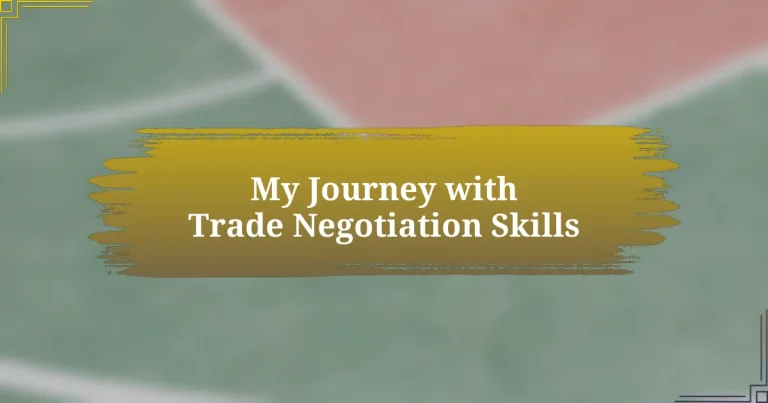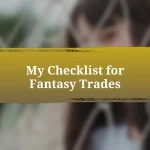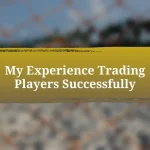Key takeaways:
- Effective trade negotiations require preparation, empathy, and strategic timing, helping negotiators read situations and players accurately.
- Building rapport with trading partners can create a favorable environment for discussions, leading to successful exchanges.
- Analyzing player value involves not only statistics but also context, including player performance trends, injuries, and team dynamics.
- Learning from negotiation failures is crucial for improvement; reflecting on missteps can refine strategies for future trades.
Author: Emma Hartley
Bio: Emma Hartley is an accomplished author known for her compelling narratives that explore the complexities of human relationships and societal themes. With a background in psychology and literature, her work often fuses emotional depth with sharp wit, captivating readers around the world. Emma’s novels have earned critical acclaim and numerous awards, solidifying her place in contemporary fiction. When she’s not writing, she enjoys hiking and volunteering with local literacy programs. Emma resides in Seattle with her two rescue dogs, and she is currently working on her next novel.
Understanding trade negotiation skills
Trade negotiation skills are crucial in ensuring successful exchanges, and they often go beyond just making offers and counteroffers. I remember a time when I navigated a particularly complex trade that involved multiple players; it felt like a strategic chess game. The ability to read my opponent’s intentions and emotions was just as vital as knowing my fantasy roster inside out.
Have you ever felt that anxious rush before making a big trade? That moment when you realize that not only is your team at stake, but also your standing in the league? I learned the importance of preparation and understanding my own team’s weaknesses during those negotiations. By clearly defining what I wanted and how much I was willing to sacrifice, I made more confident decisions.
Listening is another key component of successful trade negotiations. Once, while discussing a potential trade, my partner revealed their uncertainty about a certain player’s performance. I seized that moment to address their concerns, which ultimately led them to accept my offer. This experience highlighted how empathetic engagement can turn negotiations in your favor. How can you leverage listening to enhance your trading strategies?
Strategies for effective player trade
Identifying the right players for trade is a strategic move that can make or break your fantasy season. I remember targeting a player who had been underperforming but had a history of explosive outings. This decision wasn’t just about statistics; it involved predicting when a player might hit their stride again. Have you considered how aligning a trade with a player’s schedule could amplify your chances of success?
Timing is another crucial element in trade negotiations. I once proposed a deal at the peak of a player’s performance, but it backfired. I realized afterward that catching my trading partner just before their player’s bye week might have been a better tactic. How do you assess the best moments to strike a deal in your league?
Building rapport with your trading partners has also proven essential in my experience. I often start discussions casually, exchanging thoughts about the season before diving into trade specifics. In one instance, a light-hearted conversation led to an unexpected player exchange that benefited us both significantly. How do you cultivate relationships that smooth out the negotiation process for trades?
Analyzing player value in trades
Analyzing player value in trades requires a blend of statistics and intuition. There was a time when I misjudged a rookie’s potential, only to see them flourish later in the season. It made me reflect on the importance of not just looking at current performance but also potential future outcomes. Have you ever overlooked a player just because their numbers didn’t initially wow you?
To truly evaluate player value, I’ve learned to consider factors like matchups, injuries, and even team dynamics. For instance, when a starting quarterback went down, I capitalized on the ripple effect it created for his wide receivers. It’s fascinating how understanding the broader context can reveal hidden opportunities in trades. How do you incorporate team trends into your player evaluations?
I also keep an eye on the trade market, looking for patterns in what players are valued at by others in my league. I remember a season when I spotted a trend of undervaluing tight ends, which allowed me to snag a high-performing one at a bargain price. It’s about being aware and adapting to how others perceive value—have you ever found yourself ahead of the curve in evaluating player worth?
My personal experiences with trades
There was a time I held onto a player for way too long, convinced they would turn things around. I finally decided to trade them for a mid-tier receiver, and to my surprise, that player exploded in the subsequent weeks while my holdout continued to struggle. Have you ever hesitated to let go of a player, thinking they might find their groove again?
I also recall a pivotal trade that shaped my season. I was eyeing a top-tier running back but knew I had to give up a star wide receiver to make it happen. The trade felt risky at first, but once I saw how much it strengthened my lineup, I knew I’d made the right choice. Have you ever taken a leap of faith with a trade that changed your entire outlook for the season?
Reflecting on these experiences, I realize that trades are not just about numbers; they’re emotional decisions that can lead to triumph or regret. Each trade taught me more about my instincts and the fine balance between analysis and gut feeling. Have you ever felt that rush of making a trade that felt right in your gut, even if the stats didn’t fully support it?
Lessons learned from negotiation failures
Negotiation failures can sting, and I’ve certainly had my share. I once pushed for an exchange I thought was a steal, only to find out later that I undervalued a supporting player who ended up being a game changer for my opponent’s team. It taught me that sometimes, in the heat of negotiation, I became too fixated on my desired outcome and overlooked the bigger picture. Have you ever been so focused on getting what you want that you missed the value right in front of you?
Another lesson came when I approached a trade like a chess game, calculating every possible move. However, I failed to consider the emotional aspect—it didn’t resonate with the other manager, who felt undervalued. The deal fell apart, and I missed out on an opportunity that could have enhanced my roster. It’s crucial to remember that while analysis is fundamental, understanding the human element of negotiations can be just as important. Have you found that emotional intelligence plays a role in your trading success?
Ultimately, every failed negotiation is a chance to reflect. I learned to ask myself questions like: What didn’t I see coming? How could I have approached the deal differently? Embracing these moments of introspection has made me a more strategic negotiator, allowing me to refine my approach over time. Have you taken time to analyze your negotiation missteps and grow from them?
Tips for successful trade negotiations
In trade negotiations, preparation is key. I remember sharpening my skills by thoroughly researching player statistics and team needs ahead of time. When I approached another manager, I confidently presented my offer, highlighting how it met both our interests. It’s fascinating to see how well-prepared information can set the stage for a more constructive discussion. Have you found that solid preparation makes you more persuasive during negotiations?
Building rapport cannot be overstated. I once had a successful trade because I took time to genuinely connect with the other player manager. We exchanged thoughts about the season and our strategies before diving into the trade discussion. That casual chatter created a positive atmosphere, making them more receptive to my offers. How do you create connections with your league mates? Is it about shared interests outside of fantasy football?
Finally, timing is everything. I learned this firsthand during a pivotal moment in my league. I made a trade offer right before a player’s breakout game, which increased their value exponentially. In hindsight, I realized that recognizing when to act can dramatically influence the outcome. Have you ever missed an opportunity by waiting too long to strike a deal? Understanding the ebb and flow of player performance can really elevate your negotiation game.















